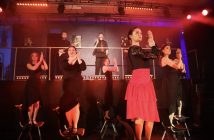Imagine it’s your first year in a job and you suddenly were given one of the biggest tasks in your career. That’s what the Southampton University Symphony Orchestra‘s (SUSO’s) new conductor Matt Hardy has on his hands as he prepares to conduct SUSO’s centenary concert at the Southampton Guildhall featuring returning alumni as the orchestra celebrate 100 years since their formation in 1920. I sat down with Matt a month prior to discuss the concert itself, finding out how he got into conducting, and why students should be more interested in listening to classical music live.
How did you get into conducting?
I was a trumpet player and I studied trumpet playing as part of my undergraduate degree. Unfortunately, I had problems with my playing, so I had to drop out of my degree and couldn’t do any more playing, so I thought about having a go at conducting. I took up this job as a choir conductor for Barts Medical School – there were about 15 members and I had no previous experience, but I did that for seven years. It was a first in a series of jobs at different universities – Imperial College London, University College London and University of Arts London, – and I felt that all of them set me up well to come here and be the conductor for SUSO.
What drew you towards SUSO?
I mean, it’s relatively rare to get a position like this — especially with one that is well resourced as SUSO. But there is something rather appealing about working with students because of their quickness of learning and their willingness to just jump into the unknown! Being SUSO conductor in general is quite a privilege because I’m working with such committed and talented people, and repertoire that is great. Even though I never have that much of an overriding career ambition and instead look what’s in front of me and do a good job out of it, I want to make sure that the students are getting the most from this experience.
What pieces are you playing in this Centenary Concert?
For our 100th anniversary this term, we have some great pieces! There is ‘An Alpine Symphony’ by Richard Strauss, as well as a brand-new piece called ‘The Albatross’ by Hope Felts King who is a percussionist of our orchestra. In addition, we are playing Mozart’s ‘Horn Concerto No.4’ and our assistant conductor Ollie Downer is doing the third act Prelude to Richard Wagner’s ‘Lohengrin’.
Why did you choose ‘An Alpine Symphony’?
For ‘Alpine Symphony’, we needed to find something absolutely massive and would include all of the alumni who are returning to play in this one-off concert. It was the first piece that I had in mind because I studied it as a student and loved it, and it’s also rarely played within adult orchestras so we hoped it would attract alumni to come back and play for the concert. In addition, I think it’s really important for members of the orchestra to have such a great experience of playing something that they will remember 10 or 20 years later, so ‘An Alpine Symphony’ would be an epic way to achieve this, as well as celebrate 100 years of SUSO.
What about the other pieces on offer?
In terms of the Mozart, there is a sort of linkage with ‘Alpine’ because Richard Strauss’s father (Franz Strauss) was a French horn player who wrote two Horn Concertos that were influenced by Mozart. So, when you listen to both ‘Horn Concerto No.4’ and ‘Alpine’, you might be able to pick out some similarities within the Horn parts. For ‘The Albatross’, that was a result of a composition competition for students, which Hope Felts-King won. The music department at the university is very strong and you want that to be celebrated within SUSO so students can feel proud and cherish their experience and this is a great way to showcase that, as well as celebrate a fellow student’s own work.
Do you feel there is a sense of pressure in delivering this gig?
Yeah definitely! I’ve been thinking about this concert every day for the last six months, countless hours of emails, looking at the music, as well as thinking about the Southampton O2 Guildhall, which is our concert venue for this event. Normally we play in Turner Sims (Southampton University’s concert hall) which we have sold out numerous times. However, with the Guildhall, it will make the occasion very unique because it’s much grander and bigger so the sound will be different, and it will put pressure on the players. However, I think it is part of my job to encourage them to play to the best of their abilities and make members in our rehearsals to think, ‘Yes, I can get it and I’m going to get it!’
Why should students be interested in coming to SUSO’s 100th Anniversary concert?
Seeing classical music live is like no other experience, and with a live orchestra of 70 musicians who are working together on one definitive outcome, it can lead to an incredible amount of energy in the room. During our last concert when we played the end of La Valse by Maurice Ravel, everyone was pulling together, making a massive effort, and there is a sheer level of excitement you can get from it in the same manner as watching a big concert with your favourite artist. Also, when you go and see a live classical performance, you watch talented people doing something extremely well which I find very rewarding, and it comes down to why we watch any kind of performing arts. It impresses us or we think it speaks to us and I’ve lost the countless number of times when someone has come up to me after a concert who are not a musician and said, ‘Oh my word, I never imagined I could hear something like that!’. As an audience member, you are not there to listen to the notes but rather for the atmosphere and the huge amounts of tension, release, and drama that encompass that. You’re going to hear new music, things that are short and sweet which are great tunes, a brilliant soloist playing a wonderful concerto, and an epic piece full of variety, interesting effects that are unexpected and sections which highlight different areas of the orchestra. I feel that this mental listening barrier for people who find classical music challenging only exists if you haven’t been there. It becomes more relevant and you hear sounds that will resonant as they won’t on a recording and I hope after this concert they will wonder, ‘What was that barrier I was thinking about before?’.
Southampton University Symphony Orchestra’s Centenary Concert is this Saturday (March 14th) at the O2 Guildhall in Southampton at 7:30pm. You can get you tickets here!



![Midge Ure on Legacy, Live Aid, and his upcoming ‘Catalogue’ tour: ‘The idea that there could be an [AI] Ultravox in 40/50 years from now is terrifying’](https://theedgesusu.co.uk/wp-content/uploads/2024/03/download-214x140.jpg)
